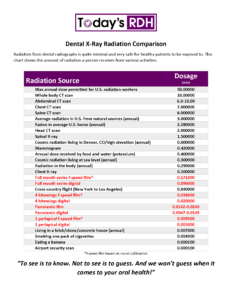How Much is Too Much Radiation?
It’s a concern that many people have. And a valid concern while being at the dentist as many people come to expect some sort of dental radiographs to evaluate their teeth. The benefit of radiographs are that they help us diagnose common problems such as cavities, gum disease and some types of oral infections. Dental radiographs allow the dentist to see inside a tooth and beneath the gums. Without necessary radiographs, more disease would go unnoticed, treatment would begin later and as a result, people would have more pain and lose more teeth. But how much is too much?
Digital dental radiographs have very low doses of radiation, producing just a fraction of what you are exposed to in other imaging procedures. The use of digital radiography has reduced the amount of radiation by 75-80%! The human body is used to getting bombarded with x-ray radiation from the general environment we live in (*click on chart below*), so our bodies are used to repairing the damage caused by low amounts of radiation. Dental radiographs have always been considered safer than other forms of medical radiation because they are directed to areas of the body that are not so radiosensitive. The x-ray machine at a dental office is quite large, but the actual x-rays come out of a very small cone. This limits the x-rays the exposure area of the actual x-ray. Very little radiation exposure occurs beyond the diameter of the beam. Also, our x-ray equipment goes under regular inspections by the state to ensure they are accurate and safe.
Radiation from dental radiographs is quite minimal and very safe for healthy patients to be exposed to. We understand you may have concerns regarding dental radiographs and we would be glad to answer them during your next appointment with us. Your need for dental radiographs depends on your age, your medical and dental history and the current condition of your mouth. The chart below shows the amount of radiations a person receives from various activities (select image to enlarge).


Leave a Reply
Want to join the discussion?Feel free to contribute!